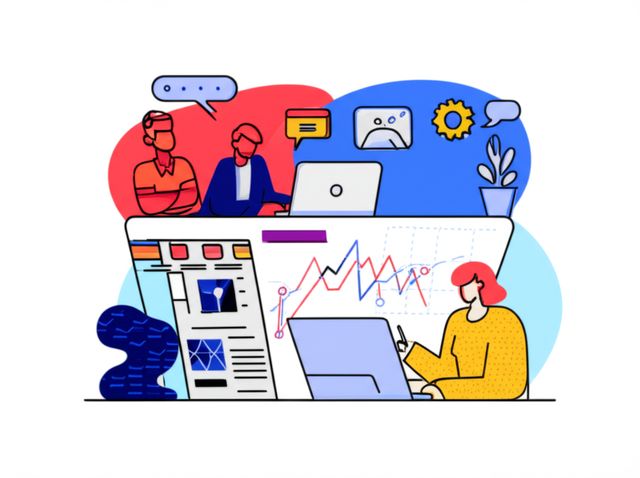Event Marketing Manager
Navigating the World of Event Marketing Management
An Event Marketing Manager is a professional who brings events to life through strategic promotion and planning. They are responsible for the entire lifecycle of an event's marketing, from the initial concept and strategy development through execution and post-event analysis. This role ensures that events not only run smoothly but also effectively reach the target audience and achieve the desired marketing objectives, such as brand awareness or lead generation.
Working as an Event Marketing Manager can be thrilling. You might find yourself orchestrating a major product launch one month and a large industry conference the next. The role often involves a dynamic mix of creativity, strategic thinking, and hands-on execution. It's a field where you see the direct impact of your work on attendee experiences and business outcomes, offering a tangible sense of accomplishment.
Understanding the Core Role
Defining Event Marketing Management
At its core, event marketing management involves using events—whether they are trade shows, conferences, product launches, webinars, or galas—as a strategic tool to meet marketing goals. An Event Marketing Manager develops and executes comprehensive marketing plans specifically designed for these events. This includes defining the event's objectives, identifying the target audience, and creating compelling messaging to attract attendees.
The role goes beyond simple promotion. It involves deep collaboration with various teams, managing budgets, negotiating with vendors and sponsors, and overseeing all marketing-related logistics. The manager ensures that every touchpoint, from the initial invitation to the post-event follow-up, aligns with the overall brand and marketing strategy.
Success in this role requires a blend of creativity for designing engaging experiences and analytical skills for measuring impact. Event Marketing Managers are ultimately responsible for making sure an event not only happens but also delivers measurable results, contributing directly to the organization's success.
This foundational course provides a solid overview of crafting effective marketing strategies, which is central to event marketing.
To understand the broader context, consider these resources on marketing principles and planning.
Event Marketing vs. General Marketing
While Event Marketing Managers share skills with general marketers, their focus is distinctly on the unique lifecycle and demands of events. General marketing roles often cover broader, ongoing campaigns across various channels. Event marketing, however, is typically project-based, with intense periods of activity leading up to specific dates.
Event Marketing Managers need specialized knowledge in areas like venue logistics, attendee engagement strategies for live environments (both physical and virtual), and on-the-spot problem-solving. They work closely with event planners, sales teams, and external vendors in a way that differs from the typical workflows of digital or brand marketers.
Furthermore, the success metrics in event marketing are often more immediate and tangible, such as attendance numbers, lead quality from the event, and post-event engagement rates. This requires a specific skill set in tracking and analyzing event-specific data to demonstrate return on investment (ROI).
Understanding digital marketing is crucial, as it's heavily used to promote events and engage audiences before, during, and after.
Common Industries and Settings
Event Marketing Managers are found across a diverse range of industries. Technology companies frequently host product launches, user conferences, and developer summits. Non-profit organizations rely on fundraising galas, awareness campaigns, and community events. The corporate world utilizes conferences, trade shows, and internal events for training and team building.
Entertainment and sports industries heavily depend on event marketing to promote games, concerts, and festivals. Hospitality venues like hotels and convention centers often employ event marketing professionals to attract large gatherings. Agencies specializing in event management or marketing also hire for this role, serving clients across various sectors.
The setting can range from working in-house for a single company to managing events for multiple clients at an agency. Regardless of the industry, the goal remains consistent: leveraging events to build brands, engage audiences, and drive results.
For those interested in specialized areas like sports, these resources offer relevant insights.
The Event Marketing Workflow
The work of an Event Marketing Manager follows a distinct cycle: planning, execution, and evaluation. The planning phase involves defining goals, understanding the target audience, developing the event concept and messaging, setting budgets, and creating a detailed marketing timeline.
Execution is where the plan comes to life. This involves managing promotional campaigns across various channels (email, social media, paid ads), coordinating with design teams for materials, working with PR for media coverage, managing registration, and liaising with vendors and internal teams. During the event itself, the manager often oversees marketing activities on-site, ensuring smooth operations and attendee engagement.
After the event, the evaluation phase begins. This involves gathering feedback, analyzing data (attendance, leads generated, social media engagement, ROI), and producing post-event reports. These insights are crucial for measuring success against objectives and informing strategies for future events.
Key Responsibilities of an Event Marketing Manager
Budget Management and Resource Allocation
A significant responsibility for Event Marketing Managers is managing the event budget effectively. This involves estimating costs for marketing activities, venue rentals, technology platforms, staffing, promotional materials, and vendor services. Careful planning is needed to allocate resources wisely, ensuring maximum impact within financial constraints.
Managers must track expenses diligently throughout the event lifecycle, comparing actual spending against the budget. They often need to negotiate contracts with vendors and suppliers to secure favorable rates. Strong financial acumen and attention to detail are essential for preventing budget overruns and demonstrating the financial value of the event.
Resource allocation also extends to human resources, assigning tasks to team members and ensuring that marketing efforts are appropriately staffed. This requires balancing costs with the need for quality execution to achieve event goals.
Understanding financial planning and resource management is key.
Cross-Functional Team Coordination
Events rarely happen in isolation; they require input and support from multiple departments. Event Marketing Managers act as key coordinators, liaising with sales teams to align event goals with lead generation targets, public relations (PR) teams for media outreach, creative teams for branding and materials, and product teams for showcasing offerings effectively.
Effective communication and interpersonal skills are vital for managing these relationships. The manager must ensure all stakeholders are informed, aligned on objectives, and fulfilling their respective roles. This often involves navigating different priorities and perspectives to achieve a unified event strategy.
Coordination also extends externally to vendors, sponsors, speakers, and venue staff. Building and maintaining strong working relationships with these partners is crucial for seamless event execution and successful outcomes. Familiarity with project management principles can be highly beneficial.
Public relations is often closely tied to event marketing efforts.
Metrics-Driven Campaign Evaluation
Modern event marketing relies heavily on data to measure success and inform future strategies. Event Marketing Managers are responsible for defining key performance indicators (KPIs) aligned with event objectives. These might include registration numbers, attendance rates, lead generation quantity and quality, social media engagement, press mentions, and ultimately, return on investment (ROI).
Tracking these metrics requires proficiency with various analytical tools, from web analytics for tracking campaign sources to CRM systems for monitoring lead progression and event management platforms for attendee engagement data. The manager must analyze this data to understand what worked well and what could be improved.
Presenting these findings clearly to stakeholders is also crucial. Post-event reports should provide actionable insights, demonstrating the event's impact and justifying the resources invested. This data-driven approach allows for continuous improvement and optimization of event marketing efforts.
These courses delve into using data analytics specifically for marketing purposes.
Crisis Management and Contingency Planning
Events, especially live ones, are susceptible to unforeseen issues, ranging from technical difficulties and speaker cancellations to weather disruptions or even larger crises. A key responsibility of an Event Marketing Manager is anticipating potential problems and developing contingency plans.
This involves risk assessment during the planning phase and establishing clear protocols for handling various scenarios. Strong problem-solving skills and the ability to remain calm under pressure are essential. The manager must make quick, effective decisions to mitigate negative impacts and ensure the event can continue as smoothly as possible.
Communication is critical during a crisis, both internally with the team and externally with attendees and stakeholders. Having pre-prepared communication templates and defined chains of command can save valuable time when issues arise. Effective crisis management protects the brand's reputation and ensures a positive experience for attendees despite challenges.
Formal Education Pathways
Relevant Undergraduate Majors
While a specific degree isn't always mandatory, a bachelor's degree is often preferred by employers. Common fields of study include Marketing, Communications, Public Relations, Hospitality Management, or Business Administration. These programs provide foundational knowledge in business principles, marketing strategies, communication techniques, and consumer behavior.
Coursework in areas like advertising, digital marketing, market research, public speaking, and project management is particularly relevant. Some universities may offer specific courses or concentrations in event management or experiential marketing, providing more targeted preparation.
Beyond formal coursework, internships or volunteer experience in event planning or marketing roles during college are highly valuable. They offer practical experience and networking opportunities that can significantly boost a graduate's competitiveness in the job market.
Advanced Degrees and Specializations
For those seeking leadership roles or specialized expertise, a Master of Business Administration (MBA) or a master's degree in Marketing or Communications can be beneficial. Some MBA programs offer concentrations in marketing or even niche areas related to event or hospitality management.
An advanced degree can deepen strategic thinking, leadership capabilities, and financial management skills. It may provide an advantage for higher-level positions like Marketing Director or Director of Experiential Marketing. However, practical experience often weighs heavily in this field, and an advanced degree isn't always a requirement for advancement.
Choosing whether to pursue an advanced degree depends on individual career goals and the specific requirements of desired roles or industries. Weigh the potential benefits against the time and financial investment required.
Certification Programs
Several industry organizations offer certification programs for event professionals. Certifications like the Certified Meeting Professional (CMP) or the Certified Special Events Professional (CSEP) demonstrate a level of expertise and commitment to the profession.
These programs typically require a combination of industry experience and passing a comprehensive exam covering various aspects of event management, including marketing, logistics, finance, and ethics. While not always required by employers, certifications can enhance credibility and potentially open doors to new opportunities.
Deciding whether a certification is "worth it" depends on your career stage and goals. Research specific certifications relevant to your niche within event marketing and consider how they align with employer expectations in your target industry or region.
Leveraging Online Courses for Skill Development
Online courses offer a flexible and accessible way to build foundational knowledge or acquire specific skills needed for event marketing management. Platforms like OpenCourser aggregate thousands of courses covering everything from digital marketing basics and social media strategy to project management and data analytics.
Students can use online courses to supplement their formal education, diving deeper into specific areas like event management software or virtual event technologies. Professionals can use them for upskilling, staying current with industry trends like AI in marketing or sustainability practices. Those pivoting careers can build essential competencies step-by-step.
Look for courses that offer practical projects or case studies to apply learned concepts. Building a portfolio of work, even from course projects, can demonstrate skills to potential employers. OpenCourser's Learner's Guide provides tips on structuring self-learning and making the most of online educational resources.
These courses cover general digital marketing skills highly relevant to promoting events.
These books offer insights into building relationships and influencing audiences, key aspects of event marketing.
Digital Tools for Event Marketing Managers
Event Management Software
Event Marketing Managers rely heavily on specialized software to streamline planning, execution, and analysis. Platforms like Cvent, Eventbrite, or Bizzabo offer integrated solutions for tasks such as registration management, ticketing, attendee communication, website creation, and mobile app development.
These tools help automate processes, manage large amounts of data efficiently, and provide a central hub for event logistics. They often include features for creating marketing emails, managing speaker submissions, and facilitating networking among attendees.
Familiarity with one or more major event management platforms is often a required skill. Understanding how to leverage these tools effectively can significantly improve efficiency and the overall attendee experience.
This book is specifically about event marketing strategy using Cvent, a major platform.
Audience Analytics Platforms
Understanding attendee behavior and measuring marketing effectiveness requires robust analytics tools. Event Marketing Managers use platforms like Google Analytics to track website traffic, campaign performance, and conversion rates related to event registration.
Within event management software, built-in analytics provide insights into registration trends, session popularity, and attendee engagement levels during the event (especially for virtual or hybrid formats). Social media analytics tools help track reach, engagement, and sentiment related to event promotions.
Proficiency in interpreting data from these platforms allows managers to make informed decisions, optimize campaigns in real-time, and demonstrate the event's impact through post-event reporting. Data-driven insights are increasingly crucial for justifying budgets and refining strategies.
Specific platforms are often used for social media marketing and analytics.
Virtual and Hybrid Event Technologies
The rise of virtual and hybrid events has necessitated familiarity with platforms designed for online or blended experiences. Tools like Zoom Events, Hopin, or Remo provide features specifically for virtual conferences, including live streaming, interactive Q&A, virtual booths, and networking lounges.
Event Marketing Managers need to understand the capabilities and limitations of different platforms to select the right technology for their event goals. They must also consider how to market and structure events that engage both in-person and remote audiences simultaneously in a hybrid setting.
Mastering these technologies involves understanding streaming quality, interactive features, data collection capabilities, and integration possibilities with other marketing tools. As hybrid formats become more common, expertise in this area is increasingly valuable.
Integration with CRM Systems
Connecting event activities with the broader sales and marketing ecosystem is crucial, often facilitated through Customer Relationship Management (CRM) systems like Salesforce or HubSpot. Event Marketing Managers ensure that attendee data and leads generated from events flow seamlessly into the CRM.
This integration allows sales teams to follow up on leads efficiently and provides a holistic view of how events contribute to the customer journey and overall revenue generation. It enables personalized post-event communication based on attendee interactions or interests expressed during the event.
Understanding CRM integration ensures that event marketing efforts are not siloed but contribute directly to measurable business outcomes. It requires collaboration with sales and marketing operations teams to set up and maintain these data flows.
Career Progression in Event Marketing
Typical Entry-Level Roles
Individuals often start their careers in supporting roles before becoming an Event Marketing Manager. Positions like Marketing Coordinator, Event Assistant, Marketing Specialist, or Event Marketing Specialist provide foundational experience.
In these roles, responsibilities might include assisting with logistical coordination, managing social media promotion, drafting email campaigns, supporting vendor communication, and helping with on-site execution. These positions allow newcomers to learn the ropes, develop core skills, and understand the event lifecycle.
Gaining experience across different facets of marketing and event planning in these initial roles builds a strong foundation for taking on the broader strategic and management responsibilities of an Event Marketing Manager.
Promotion Criteria and Timelines
Advancement to an Event Marketing Manager role typically requires several years of relevant experience (often 2-5 years). Promotion often depends on demonstrating proficiency in managing smaller events or specific aspects of larger ones, strong project management skills, budget awareness, and successful campaign execution.
Key criteria include the ability to think strategically, collaborate effectively across teams, manage vendor relationships, analyze results, and handle pressure. Showing initiative, consistently delivering successful outcomes, and developing leadership potential are also important factors.
Timelines can vary based on individual performance, company size and structure, and industry. Building a strong portfolio showcasing successful events and quantifiable results is crucial for demonstrating readiness for promotion.
Alternative Career Paths (Agency vs. Corporate)
Event Marketing Managers can pursue careers in different settings, primarily corporate (in-house) or agency environments. Working in-house means focusing on events for a single company's brand, products, or services. This often allows for deep immersion in a specific industry and brand identity.
Working at an event marketing or management agency involves planning and executing events for various clients across different industries. This path offers exposure to diverse event types and challenges, often demanding adaptability and strong client management skills. The pace can be faster, with potentially more variety in day-to-day work.
Some professionals may also choose to freelance, offering their event marketing expertise on a project basis. Each path offers unique experiences and opportunities for growth, catering to different work style preferences and career ambitions.
Related fields like brand management offer alternative avenues for marketing professionals.
Executive-Level Opportunities
With significant experience and proven success, Event Marketing Managers can advance to more senior leadership roles. Titles might include Senior Event Marketing Manager, Director of Event Marketing, Director of Experiential Marketing, or even Head of Marketing or Vice President of Marketing, depending on the organization's structure.
These executive positions involve higher-level strategic planning, managing larger teams, overseeing significant budgets, shaping the overall event portfolio, and aligning event strategy with broader business objectives. They require strong leadership, strategic vision, and financial acumen.
Progression to this level often necessitates a track record of delivering high-impact events, demonstrating significant ROI, and contributing strategically to the company's growth and brand reputation. Networking and continuous professional development are key throughout the career journey.
Global Market Trends Impacting Event Marketing Managers
Post-Pandemic Shifts to Hybrid Events
The event landscape has significantly shifted, with hybrid events becoming a prominent feature. While in-person events remain highly valued (rated important by over 95% of planners in one survey), hybrid models blending physical and digital experiences offer increased reach and accessibility. Statistics suggest a large majority of planners expect to incorporate hybrid formats moving forward.
Event Marketing Managers must now master strategies to engage both live and virtual audiences simultaneously. This requires proficiency in virtual event platforms, understanding different engagement tactics for each audience segment, and ensuring seamless integration between the physical and digital components. According to some 2025 forecasts, about 78% of planners anticipate using hybrid formats.
This trend demands greater technological savvy and adaptability, pushing managers to innovate in how they design, market, and measure the success of events that cater to diverse participation modes. Data from industry reports like this one from AIMultiple highlight the persistence and evolution of hybrid models.
Sustainability Requirements in Event Planning
Growing environmental awareness is making sustainability a key consideration in event planning and marketing. Attendees and sponsors increasingly expect events to demonstrate environmental responsibility. Event Marketing Managers are tasked with incorporating sustainable practices into their strategies.
This includes promoting digital ticketing and materials to reduce paper waste, working with venues committed to green practices, sourcing sustainable merchandise, and encouraging eco-friendly transportation options. Some reports indicate over 60% of organizers are prioritizing sustainability.
Marketing communications must authentically reflect these efforts, avoiding "greenwashing" (making misleading claims about environmental benefits). Highlighting genuine sustainability initiatives can enhance brand reputation and appeal to environmentally conscious audiences. This trend requires managers to stay informed about best practices and vendor options for greener events.
This book explores the intersection of marketing and environmental responsibility.
Geographic Demand Variations
The demand for event marketing expertise can vary significantly by geographic location and industry concentration. Major metropolitan areas with strong corporate, tech, or entertainment sectors often have a higher concentration of event marketing roles.
Salary benchmarks also show considerable variation by region. For instance, data from ZipRecruiter and Salary.com suggest average salaries can differ based on state and city, influenced by factors like cost of living and local market demand. Understanding these regional differences is important for career planning and salary negotiations.
Globalization also impacts the field, with international events requiring managers to navigate cultural nuances, time zones, and logistical complexities across borders. This may require additional skills in cross-cultural communication and international marketing.
AI's Role in Personalized Event Experiences
Artificial Intelligence (AI) is increasingly influencing event marketing, offering new ways to enhance efficiency and personalize attendee experiences. AI tools can analyze attendee data to provide personalized session recommendations, facilitate AI-powered matchmaking between attendees and sponsors, and optimize marketing campaigns.
Chatbots powered by AI can provide instant support to attendees, answering common questions and improving service. AI can also assist in content creation for event promotion and analyze sentiment from social media feedback. Recent surveys indicate a significant portion of marketers see AI as a primary focus, using it for tasks like tracking engagement and logistics.
While AI offers powerful capabilities, Event Marketing Managers must understand how to implement these tools ethically and effectively. The goal is to leverage AI to augment, not replace, the human elements of connection and experience that make events valuable. As AI adoption grows, proficiency in leveraging these technologies will become increasingly important, as noted in resources like this 2025 trends report from Remo.co.
Ethical Challenges in Event Marketing Management
Data Privacy in Attendee Tracking
Collecting attendee data is essential for personalization and measuring event success, but it raises significant ethical considerations regarding privacy. Event Marketing Managers must ensure compliance with data protection regulations like GDPR or CCPA, obtaining clear consent for data collection and usage.
Transparency about how attendee data will be used, stored, and protected is crucial. This includes data gathered through registration forms, mobile apps, RFID badges, or virtual platform interactions. Managers must implement robust security measures to prevent data breaches.
Balancing the benefits of data-driven personalization with the right to privacy requires careful judgment. Ethical data handling builds trust with attendees and protects the organization from legal and reputational risks.
Greenwashing Risks in Sustainability Claims
As sustainability becomes more important, the risk of "greenwashing"—making exaggerated or false claims about environmental practices—also increases. Event Marketing Managers must ensure that sustainability claims made in marketing materials are accurate, verifiable, and genuinely reflect the event's practices.
Authenticity is key. Promoting minor initiatives as major environmental breakthroughs can backfire if perceived as misleading by attendees or stakeholders. Focus on transparently communicating concrete actions taken, such as waste reduction figures, sourcing policies, or carbon offset programs.
Partnering with credible third-party certifications or following established sustainability guidelines can add legitimacy to claims. Ethical marketing in this area involves honesty and a commitment to continuous improvement rather than just superficial gestures.
Cultural Sensitivity in Global Campaigns
When marketing events to international audiences or planning events in different cultural contexts, sensitivity is paramount. Marketing messages, imagery, and event programming must respect diverse cultural norms, values, and communication styles.
Lack of cultural awareness can lead to misunderstandings, offense, or alienation of potential attendees. This requires thorough research into the target audience's cultural background and potentially consulting with local experts or representatives.
Event Marketing Managers must ensure that all aspects of the event, from food choices and scheduling to entertainment and dress codes, are considerate of cultural diversity. Promoting inclusivity and respect is an ethical imperative for global event marketing.
Sponsorship Transparency Requirements
Sponsorships are often a key revenue source for events, but relationships with sponsors must be managed transparently. Event Marketing Managers need to clearly disclose sponsored content or sessions to attendees, avoiding any perception of hidden influence.
Contracts with sponsors should outline expectations and deliverables clearly, ensuring alignment with the event's overall goals and ethical standards. Avoid partnerships that could create conflicts of interest or compromise the event's integrity.
Maintaining transparency builds trust with both attendees and sponsors. Ethical sponsorship management ensures that commercial partnerships enhance, rather than detract from, the attendee experience and the event's reputation.
Building a Portfolio as an Event Marketing Manager
Documenting Cross-Functional Collaborations
Your portfolio should highlight your ability to work effectively with diverse teams. Include examples of projects where you successfully collaborated with sales, PR, creative, or product teams. Describe your specific role in coordinating efforts and facilitating communication.
Detail the challenges faced during collaboration and how you navigated them. For instance, explain how you aligned differing departmental goals towards a unified event objective. Providing context about the team dynamics and your contribution demonstrates valuable interpersonal and project management skills.
Whenever possible, include testimonials or quotes from colleagues in other departments about your collaborative abilities. This adds credibility and provides external validation of your teamwork skills.
Quantifying Campaign ROI for Case Studies
Simply describing events you've worked on is not enough; demonstrating their impact is key. Structure portfolio entries as case studies that clearly outline the event's objectives, the marketing strategies you implemented, and the measurable results achieved.
Focus on quantifying outcomes whenever possible. Use specific metrics like percentage increase in lead generation, attendee acquisition cost, social media engagement rates, press coverage value, or calculated return on investment (ROI). This shows analytical capability and a focus on business results.
Explain the methods used for tracking and analysis. Highlighting your ability to connect event marketing activities to tangible business outcomes makes your portfolio significantly more compelling to potential employers.
Leveraging Volunteer and Nonprofit Opportunities
If you're new to the field or looking to gain experience in specific types of events, volunteering for nonprofits or community organizations can be invaluable. These experiences offer practical learning opportunities and allow you to build portfolio pieces, often with significant responsibility.
Document these experiences just as you would paid work. Highlight the skills you utilized, the challenges you overcame, and the impact you made, even if the scale was smaller. Working with limited budgets in nonprofits often showcases creativity and resourcefulness.
These opportunities also expand your professional network and demonstrate a commitment to community involvement, which can be viewed favorably by employers. Don't underestimate the value of well-documented volunteer experience in your portfolio.
Digital Portfolio Best Practices
Create a professional online portfolio using platforms like LinkedIn, a personal website, or dedicated portfolio sites. Ensure it is well-organized, easy to navigate, and visually appealing. Use high-quality images and videos from events (with permission) to showcase your work.
Tailor your portfolio to the types of roles you are seeking. Highlight the projects and skills most relevant to the job descriptions. Keep it updated with your latest work and accomplishments.
Include a concise professional summary or bio, your resume, and contact information. Proofread carefully for any errors. A polished digital portfolio serves as a dynamic representation of your skills, experience, and professional brand.
Frequently Asked Questions (Career Focus)
Is certification XYZ worth pursuing?
The value of certifications like the Certified Meeting Professional (CMP) or Certified Special Events Professional (CSEP) depends on your career goals and industry context. They can enhance credibility, demonstrate commitment, and potentially provide a competitive edge, especially if preferred by employers in your target sector.
Consider the required experience, cost, and time commitment. Research whether employers in your desired roles or companies typically value these certifications. While not always mandatory, they signal a recognized standard of knowledge and professionalism in the field.
Ultimately, strong practical experience and a portfolio showcasing successful events often carry more weight than certifications alone. However, pursuing certification can be a valuable step for formalizing expertise and expanding professional networks.
How to transition from project management to event marketing?
Project management skills are highly transferable to event marketing. Both roles require strong organizational abilities, timeline management, budget tracking, and stakeholder coordination. Highlight these core competencies on your resume and in interviews.
Focus on gaining specific marketing knowledge. Take online courses in digital marketing, social media strategy, content creation, and event marketing principles. You can browse relevant courses on platforms like OpenCourser's Marketing category.
Seek opportunities to apply project management skills in a marketing or event context, perhaps through volunteer work or internal projects. Frame your project management experience in terms of delivering successful outcomes, managing resources effectively, and coordinating complex initiatives—all crucial aspects of event marketing management.
What are salary benchmarks across industries?
Salaries for Event Marketing Managers vary significantly based on factors like location, years of experience, industry, and company size. As of early 2025, data from sources like ZipRecruiter and Salary.com suggest average annual salaries in the US can range broadly, often falling between $60,000 and $150,000, with averages potentially around $100,000-$115,000.
Industries like technology or finance may offer higher compensation compared to nonprofit sectors. Major metropolitan areas typically have higher salaries but also higher costs of living. Research salary data specific to your location and target industry using online resources and networking.
Keep in mind that these are benchmarks, and actual offers depend on individual qualifications and negotiation. The U.S. Bureau of Labor Statistics provides data for the broader category of "Meeting, Convention, and Event Planners," which reported a median annual wage of $56,920 in May 2023, though Event Marketing Manager roles often involve more strategic marketing responsibilities and may command higher pay.
You can find some general salary data for meeting and event planners from the Bureau of Labor Statistics Occupational Outlook Handbook.
What are the prospects for freelance vs. full-time employment?
Both freelance and full-time employment are viable paths in event marketing. Full-time roles offer stability, benefits, and the opportunity to deeply integrate into a company's culture and long-term strategy. This is common in corporate settings and larger organizations.
Freelancing provides flexibility, variety in projects and clients, and potentially higher earning potential per project. However, it requires strong self-discipline, business development skills to find clients, and managing inconsistent income streams and benefits independently.
The choice depends on personal preferences for work-life balance, risk tolerance, and career goals. Some professionals may transition between full-time and freelance work at different career stages. The "gig economy" has increased opportunities for freelance event marketers.
How might AI tools impact job security?
AI is likely to change aspects of the Event Marketing Manager role rather than eliminate it entirely. AI tools can automate routine tasks like data analysis, content generation drafts, and chatbot responses, potentially freeing up managers to focus on higher-level strategy, creativity, and relationship building.
Professionals who embrace AI tools and learn how to leverage them effectively will likely enhance their value. Skills like strategic thinking, creativity, complex problem-solving, negotiation, and interpersonal communication remain difficult for AI to replicate and will continue to be essential.
The impact on job security will likely depend on individuals' ability to adapt and integrate AI into their workflow. Rather than a threat, AI can be viewed as a tool that enhances capabilities and allows managers to deliver more personalized and efficient event experiences.
What essential soft skills are rarely mentioned in job postings?
While job descriptions list technical skills, certain soft skills are crucial yet often understated. Exceptional **calmness under pressure** is vital, as events inevitably involve unexpected challenges requiring quick thinking and composure. **Empathy** is key for understanding attendee needs, managing client relationships, and leading teams effectively, especially during stressful periods.
**Resourcefulness** and creative problem-solving are needed to overcome obstacles, often with limited time or budget. **Diplomacy and tact** are essential when negotiating with vendors, managing stakeholder expectations, and handling sensitive situations.
Strong **active listening** skills help in truly understanding client briefs and attendee feedback. Finally, **resilience** is important for bouncing back from the intense demands and occasional setbacks inherent in event management. Cultivating these skills significantly contributes to long-term success.
Embarking on a career as an Event Marketing Manager requires a blend of creativity, strategic thinking, meticulous organization, and strong interpersonal skills. It's a dynamic field offering tangible results and the excitement of bringing experiences to life. With dedication, continuous learning, and adaptability, it can be a highly rewarding path.











